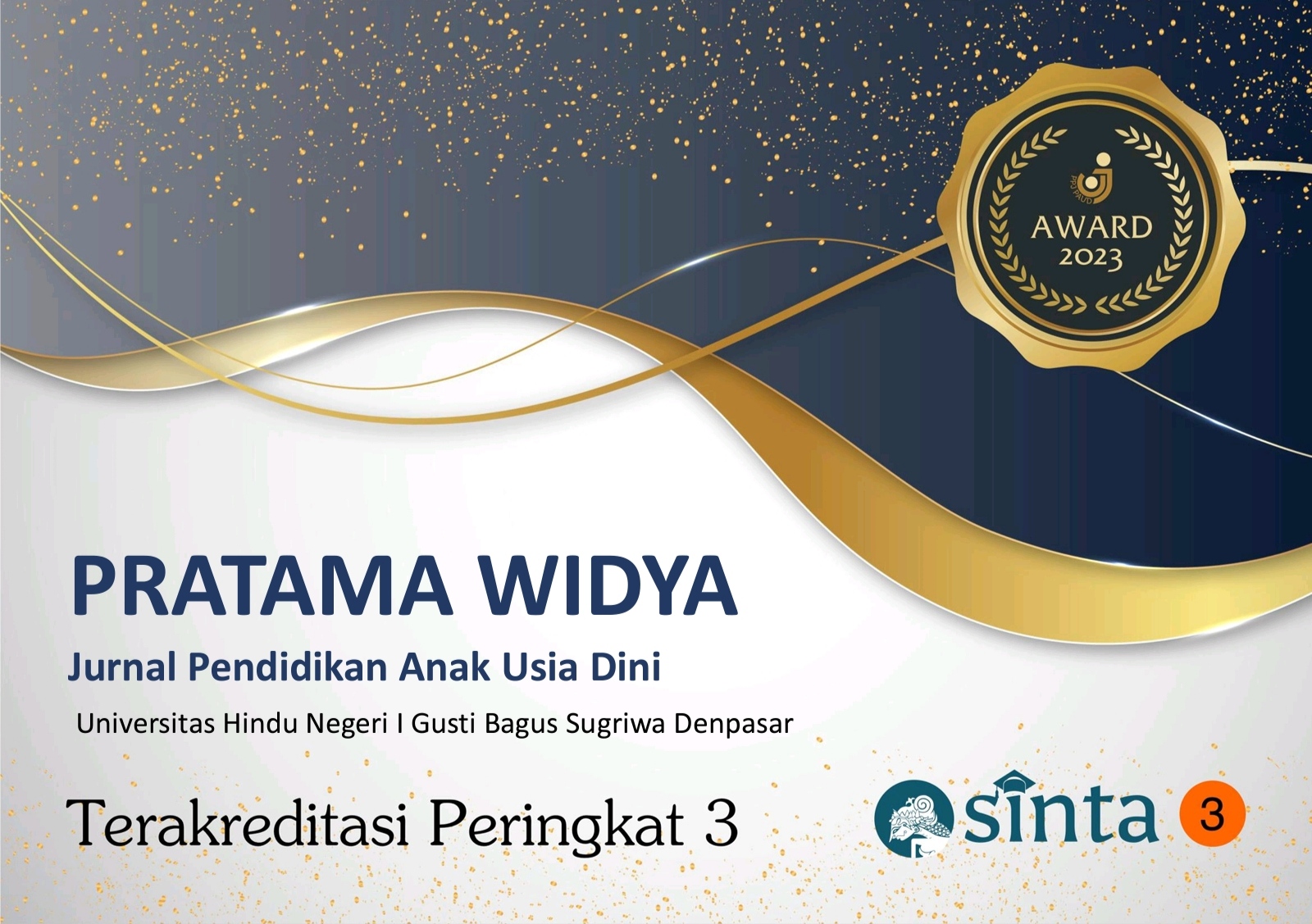CHALLENGES AND STRATEGIES IN IMPLEMENTING LEARNING ENVIRONMENT SAFETY POLICY IN INCLUSIVE EARLY CHILDHOOD EDUCATION IN BANJARMASIN AND BANJARBARU
DOI:
https://doi.org/10.25078/pw.v10i1.4287Keywords:
Safety Policy, Learning Environment, Inclusive Education, Early ChildhoodAbstract
Inclusive early childhood education (ECED) ensures all children, including those with special needs, have access to a safe learning environment. This study examines the implementation of safety policies in inclusive ECED institutions in Banjarmasin and Banjarbaru using a phenomenological approach. Data were collected through in-depth interviews, document analysis, and observations, following stages of participant selection, interviews, transcription, coding, theme development, and interpretation. Findings indicate that while safety policies are implemented, challenges remain in infrastructure, teacher training, and community awareness. Limited resources, inadequate facilities, and low parental understanding hinder inclusivity. However, teacher training and policy adaptation have improved inclusive practices. To enhance implementation, stronger government support is needed in funding, regulations, and public awareness. Key recommendations include (1) allocating budgets for inclusive infrastructure, (2) mandating specialized teacher training, (3) integrating community engagement programs, and (4) establishing monitoring mechanisms. These measures can create a more inclusive and supportive learning environment.
References
Ardoin, N. M., & Bowers, A. W. (2020). Early Childhood Environmental Education: A Systematic Review of the Research Literature. Educational Research Review, 31, 100353. https://doi.org/10.1016/j.edurev.2020.100353
Azzahra, I. M., Diana, R. R., Nirwana, E. S., Wiranata, Rz. R. S., & Andriani, K. M. (2022). Learning facilities and infrastructure based on the characteristics of Children with Special Needs in inclusive education. Al-Athfaal: Jurnal Ilmiah Pendidikan Anak Usia Dini, 5(2), 169–190. https://doi.org/10.24042/ajipaud.v5i2.14432
Barrett, P., Treves, A., Shmis, T., Ambasz, D., & Ustinova, M. (2019). The Impact of School Infrastructure on Learning: A Synthesis of the Evidence. International Bank for Reconstruction and Development. https://files.eric.ed.gov/fulltext/ED604388.pdf
Bendini, M., & Devercelli, A. (Eds.). (2022). Quality Early Learning: Nurturing Children’s Potential. The World Bank. https://doi.org/10.1596/978-1-4648-1795-3
Bertram, T., & Pascal, C. (2016). Early Childhood Policies and Systems in Eight Countries. International Association for the Evaluation of Educational Achievement (IEA).
Cardona, M. A., & Rodríguez, R. J. (2023). Guiding Principles for Creating Safe, Inclusive, Supportive, and Fair School Climates. U.S. Department of Education. https://www.ed.gov/sites/ed/files/policy/gen/guid/school-discipline/guiding-principles.pdf
Djone, R., & Suryani, A. (2019). Child workers and inclusive education in Indonesia. International Education Journal, 18(1), 48–65.
Fajri, B. R., & Jauhari, M. N. (2024). Challenges and Opportunities for Special-Needs Children in Elementary Schools. DIKODA: JURNAL PENDIDIKAN SEKOLAH DASAR, 5(01), 1–8. https://doi.org/10.37366/jpgsd.v5i01.4638
Grimes, P. (2014). Teachers, Inclusive, Child-Centred Teaching and Pedagogy. UNICEF. https://www.unicef.org/eca/sites/unicef.org.eca/files/IE_Webinar_Booklet_12.pdf
Hata, A., Town, S., Yuwono, J., & Nomura, S. (2023). Inclusive Early Childhood Education for Children with Disabilities in Indonesia. The World Bank.
Hayes, A. M., & Bulat, J. (2017). Disabilities Inclusive Education Systems and Policies Guide for Low- and Middle-Income Countries. RTI Press. https://doi.org/10.3768/rtipress.2017.op.0043.1707
Kemendikbudristek. (2023, March 14). Kemendikbudristek Ajak Wujudkan Pendidikan Inklusi yang Adil dan Merata. https://www.kemdikbud.go.id/main/blog/2023/03/kemendikbudristek-ajak-wujudkan-pendidikan-inklusi-yang-adil-dan-merata
Liu, W., Zhang, Q., & Huang, W. (2024). The Impacts of School Microenvironment on Left-behind Children’s Academic Performance. China Journal of Economics, 11(2), 447–488. https://doi.org/10.26599/CJE.2024.9300215
Mwaipopo, C., Maundeni, T., Seetso, G., & Jacques, G. (2021). Challenges in the Provision of Early Childhood Care and Education Services in Rural Areas of Botswana. African Educational Research Journal, 9(3), 753–761. https://doi.org/10.30918/AERJ.93.21.097
Sari, Z. P., Sarofah, R., & Fadli, Y. (2022). The Implementation of Inclusive Education in Indonesia: Challenges and Achievements. Jurnal Public Policy, 8(4), 264. https://doi.org/10.35308/jpp.v8i4.5420
Tsirantonaki, S., & Vlachou, A. (2024). Inclusive Educational Leadership and Research Instrument Validation: School principals’ values, knowledge, beliefs, attitudes and practices regarding inclusive education of disabled students. European Journal of Inclusive Education, 3(1), 119–141. https://doi.org/10.7146/ejie.v3i1.142505
Ummah, U. S., Tahar, M. M., Yasin, M. H. bin M., & Narmaditya, B. S. (2022). Parents, Teachers or School Principals: Which One Matters in Driving the Success of Inclusive School in Indonesia? Pegem Journal of Education and Instruction, 12(4), 321–327. https://doi.org/10.47750/pegegog.12.04.33
UNICEF. (2019). Inclusive Education. https://www.unicef.org/education/inclusive-education
UNICEF. (2021). Embracing Diversity and Inclusion for All: Landscape Analysis on Children with Disabilities in Indonesia. United Nation’s Children’s Fund. https://www.unicef.org/indonesia/media/19746/file/Landscape%20analysis%20on%20children%20with%20disabilities%20in%20Indonesia.pdf
Yasa, I. M. A., Nitiasih, P. K., & Riastini, P. N. (2023). Inclusion Issues in ECCE: Teacher Leadership From a Critical Education Point of View. Jurnal Syntax Transformation, 4(7), 79–90. https://doi.org/10.46799/jst.v4i7.762
Downloads
Published
How to Cite
Issue
Section
License
Copyright (c) 2025 Ikta Yarliani, Dyah Ageng Pramesty Koenarso

This work is licensed under a Creative Commons Attribution-NonCommercial-ShareAlike 4.0 International License.







